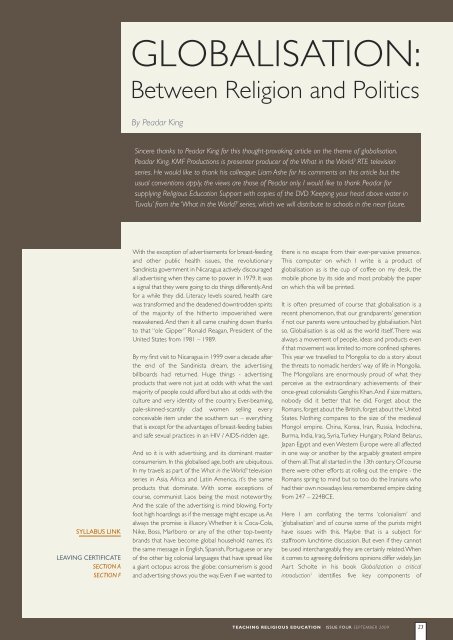TeachingRE Issue 4.pdf - the Second Level Support Service
TeachingRE Issue 4.pdf - the Second Level Support Service
TeachingRE Issue 4.pdf - the Second Level Support Service
Create successful ePaper yourself
Turn your PDF publications into a flip-book with our unique Google optimized e-Paper software.
GLOBALISATION:Between Religion and PoliticsBy Peadar KingSincere thanks to Peadar King for this thought-provoking article on <strong>the</strong> <strong>the</strong>me of globalisation.Peadar King, KMF Productions is presenter producer of <strong>the</strong> What in <strong>the</strong> World? RTE televisionseries. He would like to thank his colleague Liam Ashe for his comments on this article but <strong>the</strong>usual conventions apply, <strong>the</strong> views are those of Peadar only. I would like to thank Peadar forsupplying Religious Education <strong>Support</strong> with copies of <strong>the</strong> DVD ‘Keeping your head above water inTuvalu’ from <strong>the</strong> ‘What in <strong>the</strong> World?’ series, which we will distribute to schools in <strong>the</strong> near future.SYLLABUS LINKLEAVING CERTIFICATESECTION ASECTION FWith <strong>the</strong> exception of advertisements for breast-feedingand o<strong>the</strong>r public health issues, <strong>the</strong> revolutionarySandinista government in Nicaragua actively discouragedall advertising when <strong>the</strong>y came to power in 1979. It wasa signal that <strong>the</strong>y were going to do things differently.Andfor a while <strong>the</strong>y did. Literacy levels soared, health carewas transformed and <strong>the</strong> deadened downtrodden spiritsof <strong>the</strong> majority of <strong>the</strong> hi<strong>the</strong>rto impoverished werereawakened. And <strong>the</strong>n it all came crashing down thanksto that “ole Gipper” Ronald Reagan, President of <strong>the</strong>United States from 1981 – 1989.By my first visit to Nicaragua in 1999 over a decade after<strong>the</strong> end of <strong>the</strong> Sandinista dream, <strong>the</strong> advertisingbillboards had returned. Huge things - advertisingproducts that were not just at odds with what <strong>the</strong> vastmajority of people could afford but also at odds with <strong>the</strong>culture and very identity of <strong>the</strong> country. Ever-beaming,pale-skinned-scantily clad women selling everyconceivable item under <strong>the</strong> sou<strong>the</strong>rn sun – everythingthat is except for <strong>the</strong> advantages of breast-feeding babiesand safe sexual practices in an HIV / AIDS-ridden age.And so it is with advertising, and its dominant masterconsumerism. In this globalised age, both are ubiquitous.In my travels as part of <strong>the</strong> What in <strong>the</strong> World? televisionseries in Asia, Africa and Latin America, it’s <strong>the</strong> sameproducts that dominate. With some exceptions ofcourse, communist Laos being <strong>the</strong> most noteworthy.And <strong>the</strong> scale of <strong>the</strong> advertising is mind blowing. Fortyfoot high hoardings as if <strong>the</strong> message might escape us.Asalways <strong>the</strong> promise is illusory. Whe<strong>the</strong>r it is Coca-Cola,Nike, Boss, Marlboro or any of <strong>the</strong> o<strong>the</strong>r top-twentybrands that have become global household names, it’s<strong>the</strong> same message in English, Spanish, Portuguese or anyof <strong>the</strong> o<strong>the</strong>r big colonial languages that have spread likea giant octopus across <strong>the</strong> globe: consumerism is goodand advertising shows you <strong>the</strong> way. Even if we wanted to<strong>the</strong>re is no escape from <strong>the</strong>ir ever-pervasive presence.This computer on which I write is a product ofglobalisation as is <strong>the</strong> cup of coffee on my desk, <strong>the</strong>mobile phone by its side and most probably <strong>the</strong> paperon which this will be printed.It is often presumed of course that globalisation is arecent phenomenon, that our grandparents’ generationif not our parents were untouched by globalisation. Notso. Globalisation is as old as <strong>the</strong> world itself.There wasalways a movement of people, ideas and products evenif that movement was limited to more confined spheres.This year we travelled to Mongolia to do a story about<strong>the</strong> threats to nomadic herders’ way of life in Mongolia.The Mongolians are enormously proud of what <strong>the</strong>yperceive as <strong>the</strong> extraordinary achievements of <strong>the</strong>ironce-great colonialists Genghis Khan.And if size matters,nobody did it better that he did. Forget about <strong>the</strong>Romans, forget about <strong>the</strong> British, forget about <strong>the</strong> UnitedStates. Nothing compares to <strong>the</strong> size of <strong>the</strong> medievalMongol empire. China, Korea, Iran, Russia, Indochina,Burma, India, Iraq, Syria,Turkey Hungary, Poland Belarus,Japan Egypt and even Western Europe were all affectedin one way or ano<strong>the</strong>r by <strong>the</strong> arguably greatest empireof <strong>the</strong>m all.That all started in <strong>the</strong> 13th century. Of course<strong>the</strong>re were o<strong>the</strong>r efforts at rolling out <strong>the</strong> empire - <strong>the</strong>Romans spring to mind but so too do <strong>the</strong> Iranians whohad <strong>the</strong>ir own nowadays less remembered empire datingfrom 247 – 224BCE.Here I am conflating <strong>the</strong> terms ‘colonialism’ and‘globalisation’ and of course some of <strong>the</strong> purists mighthave issues with this. Maybe that is a subject forstaffroom lunchtime discussion. But even if <strong>the</strong>y cannotbe used interchangeably, <strong>the</strong>y are certainly related.Whenit comes to agreeing definitions opinions differ widely. JanAart Scholte in his book Globalization a criticalintroduction 1 identifies five key components ofTEACHING RELIGIOUS EDUCATION ISSUE FOUR SEPTEMBER 200923


